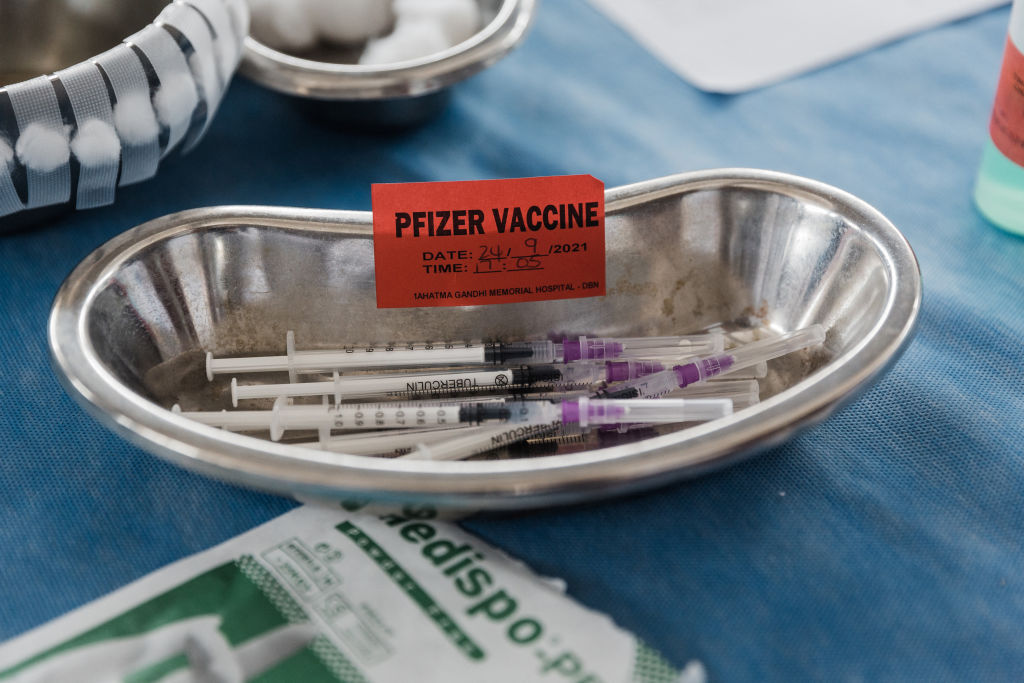COVID-19 booster discussions have led to a 'communications crisis' and 'nonstop' phone calls


A free daily email with the biggest news stories of the day – and the best features from TheWeek.com
You are now subscribed
Your newsletter sign-up was successful
The back-and-forth on COVID-19 booster shots among the Food and Drug Administration, the Centers for Disease Control and Prevention, and their advisory panels amounts to a "communications crisis," Robert Murphy, the executive director of the Institute for Global Health at Northwestern University Feinberg School of Medicine, told The Washington Post.
Many Americans seem like they aren't sure if they're eligible for a third dose of the Pfizer-BioNTech vaccine (the only one of the three available shots that's received formal discussions on boosters) because of hard-to-follow guidance from public health officials — first, the CDC advisory panel narrowed the FDA panel's initial recommendation, and then CDC Director Rochelle Walensky overruled that, broadening it again.
The situation, though, has led to a deluge of phone calls to healthcare providers at the local level. For instance, a customer service representative for Primary Health clinics in southwestern Idaho told the Post "the calls seem pretty nonstop." David Peterman, Primary Health's chief executive, said in light of the booster confusion "we went from 40,000 phone calls daily to 80,000," prompting him to ask staffers to take extra shifts.
The Week
Escape your echo chamber. Get the facts behind the news, plus analysis from multiple perspectives.

Sign up for The Week's Free Newsletters
From our morning news briefing to a weekly Good News Newsletter, get the best of The Week delivered directly to your inbox.
From our morning news briefing to a weekly Good News Newsletter, get the best of The Week delivered directly to your inbox.
Jay A. Winsten, the founding director of the Center for Health Communications at the Harvard T.H. Chan School of Public Health, thinks the solution should come from the top. While the FDA and CDC have a lot of experts in the health and science fields, "what's missing from the equation are communication experts," Winsten said, adding that "they need a seat at the table." Read more at The Washington Post.
A free daily email with the biggest news stories of the day – and the best features from TheWeek.com
Tim is a staff writer at The Week and has contributed to Bedford and Bowery and The New York Transatlantic. He is a graduate of Occidental College and NYU's journalism school. Tim enjoys writing about baseball, Europe, and extinct megafauna. He lives in New York City.
-
 Antonia Romeo and Whitehall’s women problem
Antonia Romeo and Whitehall’s women problemThe Explainer Before her appointment as cabinet secretary, commentators said hostile briefings and vetting concerns were evidence of ‘sexist, misogynistic culture’ in No. 10
-
 Local elections 2026: where are they and who is expected to win?
Local elections 2026: where are they and who is expected to win?The Explainer Labour is braced for heavy losses and U-turn on postponing some council elections hasn’t helped the party’s prospects
-
 6 of the world’s most accessible destinations
6 of the world’s most accessible destinationsThe Week Recommends Experience all of Berlin, Singapore and Sydney
-
 Trump HHS slashes advised child vaccinations
Trump HHS slashes advised child vaccinationsSpeed Read In a widely condemned move, the CDC will now recommend that children get vaccinated against 11 communicable diseases, not 17
-
 A fentanyl vaccine may be on the horizon
A fentanyl vaccine may be on the horizonUnder the radar Taking a serious jab at the opioid epidemic
-
 Health: Will Kennedy dismantle U.S. immunization policy?
Health: Will Kennedy dismantle U.S. immunization policy?Feature ‘America’s vaccine playbook is being rewritten by people who don’t believe in them’
-
 How dangerous is the ‘K’ strain super-flu?
How dangerous is the ‘K’ strain super-flu?The Explainer Surge in cases of new variant H3N2 flu in UK and around the world
-
 Vaccine critic quietly named CDC’s No. 2 official
Vaccine critic quietly named CDC’s No. 2 officialSpeed Read Dr. Ralph Abraham joins another prominent vaccine critic, HHS Secretary Robert F. Kennedy Jr.
-
 This flu season could be worse than usual
This flu season could be worse than usualIn the spotlight A new subvariant is infecting several countries
-
 FDA OKs generic abortion pill, riling the right
FDA OKs generic abortion pill, riling the rightSpeed Read The drug in question is a generic version of mifepristone, used to carry out two-thirds of US abortions
-
 Why are autism rates increasing?
Why are autism rates increasing?The Explainer Medical experts condemn Trump administration’s claim that paracetamol during pregnancy is linked to rising rates of neurodevelopmental disorder in US and UK
